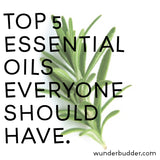
My favorite essential oils will change depending on what day you ask me. There are so many to choose from! I may fall in love with an oil new to me, or be reminded why I love an old favorite. I may have one on my favorites list in my head for years, or one on my list for just a few weeks. These 5 oils are most often on my list of favorites:
Chamomile
 Roman chamomile (Anthemis nobilis) is and indispensable sedative for calming and relaxing, especially before bed. It can be used to relieve minor anxiety, nervous tension, nervous exhaustion, and stress. With anti-inflammatory properties, chamomile is also calming to irritated skin, and is gentle enough to use (diluted to 0.5%-1%) on children.
Roman chamomile (Anthemis nobilis) is and indispensable sedative for calming and relaxing, especially before bed. It can be used to relieve minor anxiety, nervous tension, nervous exhaustion, and stress. With anti-inflammatory properties, chamomile is also calming to irritated skin, and is gentle enough to use (diluted to 0.5%-1%) on children.
This is an expensive oil, but also has a strong aroma. Straight out of the bottle, the aroma is usually objectionable. Max use on skin is 4%, but I dilute it down to 1% or less to allow its sweet fragrance to really come out.
Eucalyptus
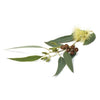 Although there are many types of eucalyptus, the one I use most is blue gum eucalyptus (Eucalyptus globulus). I think this is the best all-around eucalyptus, in both aroma and use. It's a fresh and clearing oil, a great decongestant for stuffy noses and sinuses, and may ease congested headaches. It's a must-have oil for cold and flu season.
Although there are many types of eucalyptus, the one I use most is blue gum eucalyptus (Eucalyptus globulus). I think this is the best all-around eucalyptus, in both aroma and use. It's a fresh and clearing oil, a great decongestant for stuffy noses and sinuses, and may ease congested headaches. It's a must-have oil for cold and flu season.
It can be used in dilution up to 10% on skin, but a much lower dilution is suggested. It's best used non-topically, in a diffuser, an inhaler, a steam bowl, or just a cotton ball. Use with caution on or around children, as it can be irritating.
Lavender
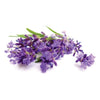 Lavandula angustifolia has so many uses, if a person could just have one essential oil, I'd always suggest this one. There is a reason it's one of the most well known essential oils.
Lavandula angustifolia has so many uses, if a person could just have one essential oil, I'd always suggest this one. There is a reason it's one of the most well known essential oils.
It's relaxing and calming (but not as sedating as chamomile), and great for stressful situations, like before an interview or when stuck in rush hour traffic. It's perfect for relaxing after a long day, or for calming before bed, especially when used the chamomile. Lavender can help ease tension and tension headaches, and may be beneficial to ease mild (non-clinical) depression and anxiety.
In addition to its ability to calm the mind and emotions, it also contains antibacterial and some antimicrobial properties and can be used to ease myriad skin issues from burns, to scrapes, to acne, to eczema.
Lavender is one of the few oils that can be used in a high dilution on skin, 16% maximum, but dilutions around 2-5% are usually strong enough for topical use.
Rose
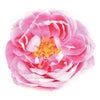 I fell in love with roses just last year. Roses for the heart, is my mantra. Rosa damascena is my favorite rose, and although rose otto (essential oil) is thought to be superior to the absolute extract, I'm a bigger fan of the aroma of the absolute.
I fell in love with roses just last year. Roses for the heart, is my mantra. Rosa damascena is my favorite rose, and although rose otto (essential oil) is thought to be superior to the absolute extract, I'm a bigger fan of the aroma of the absolute.
Rose is a comforting oil. It's calming and relaxing for stress, nervous tension and nervous exhaustion, while simultaneously it improves concentration. Topically, rose can soothe skin irritated from acne or eczema, and its antibacterial properties make it an excellent addition to deodorant.
Rose can be used up to 2% on skin, but it is a precious oil, and a 1% dilution would be just as effective in most cases.
Rosemary
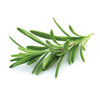 Rosmarinus officinalis is an uplifting and stimulating oil, and has been found to improve concentration and memory. This is a great oil for working or studying, and may be useful in focused scent recall (use it while studying, then again while taking an exam to help stimulate the memory).
Rosmarinus officinalis is an uplifting and stimulating oil, and has been found to improve concentration and memory. This is a great oil for working or studying, and may be useful in focused scent recall (use it while studying, then again while taking an exam to help stimulate the memory).
Rosemary can help ease cold, sinus congestion, and catarrh, when used alone, but is excellent in combination with eucalyptus and/or lavender.
Rosemary can be used topically in dilution up to 10%, but 2-4% is usually sufficient.

